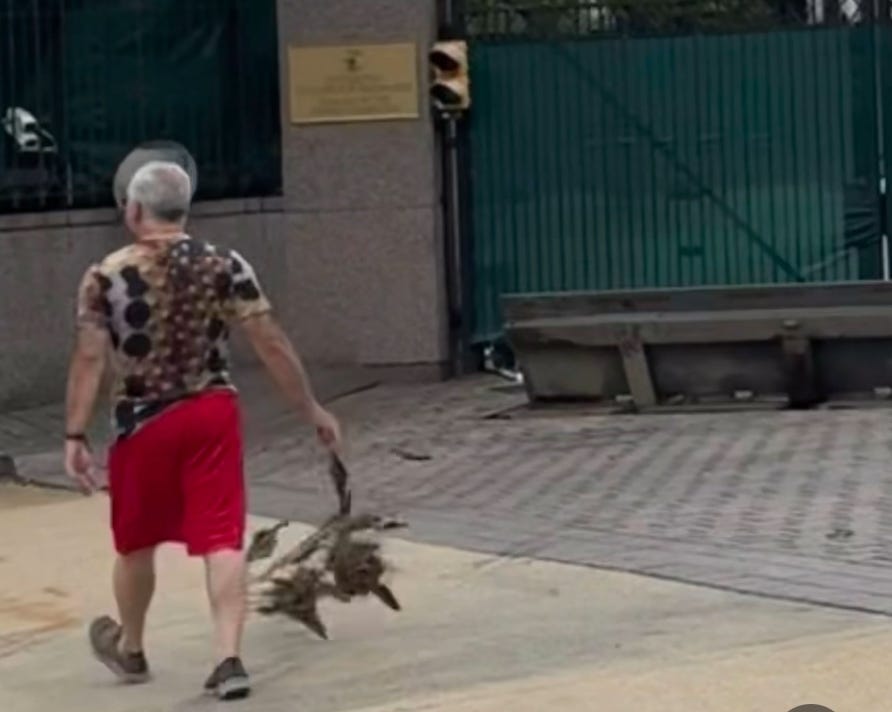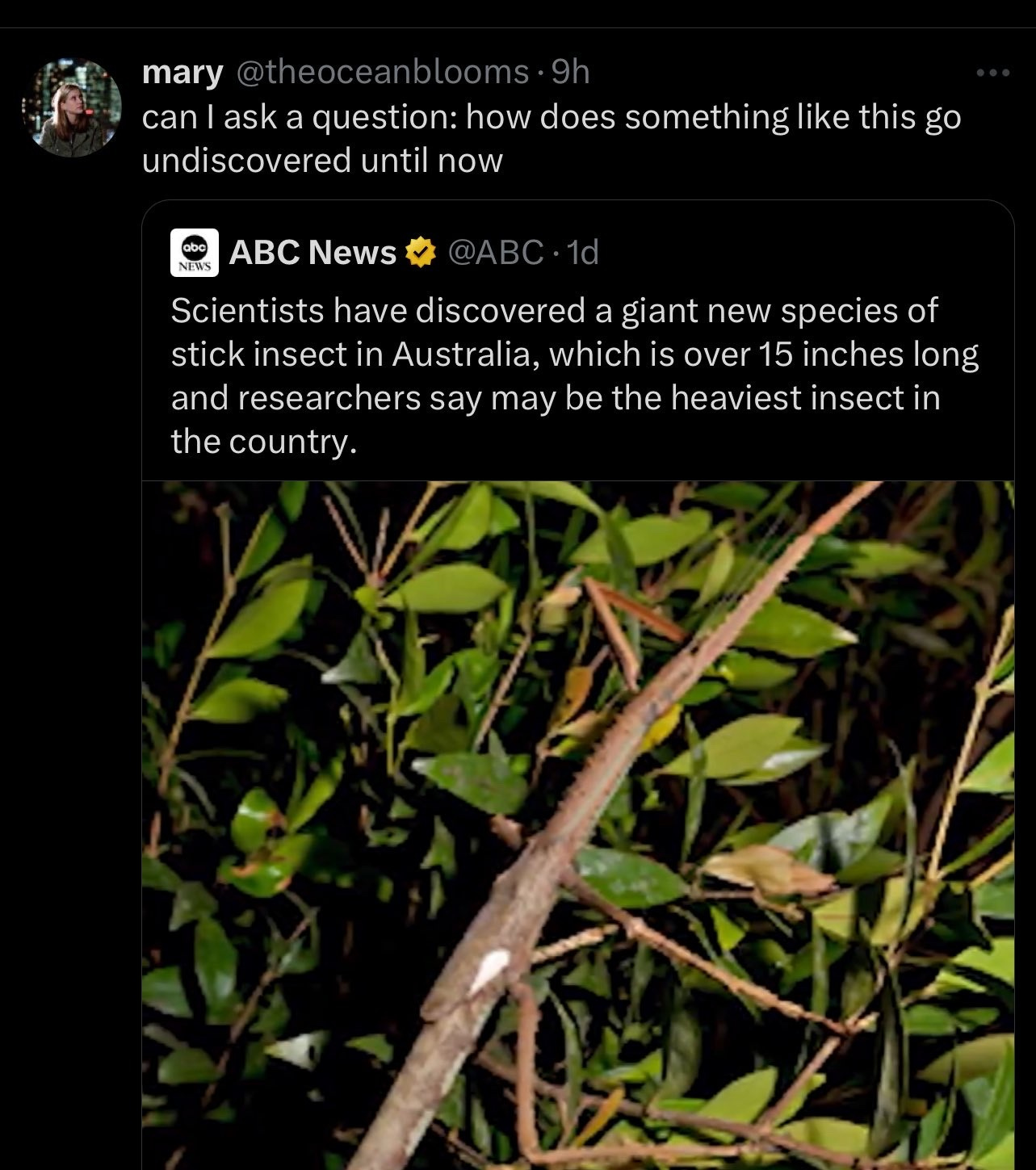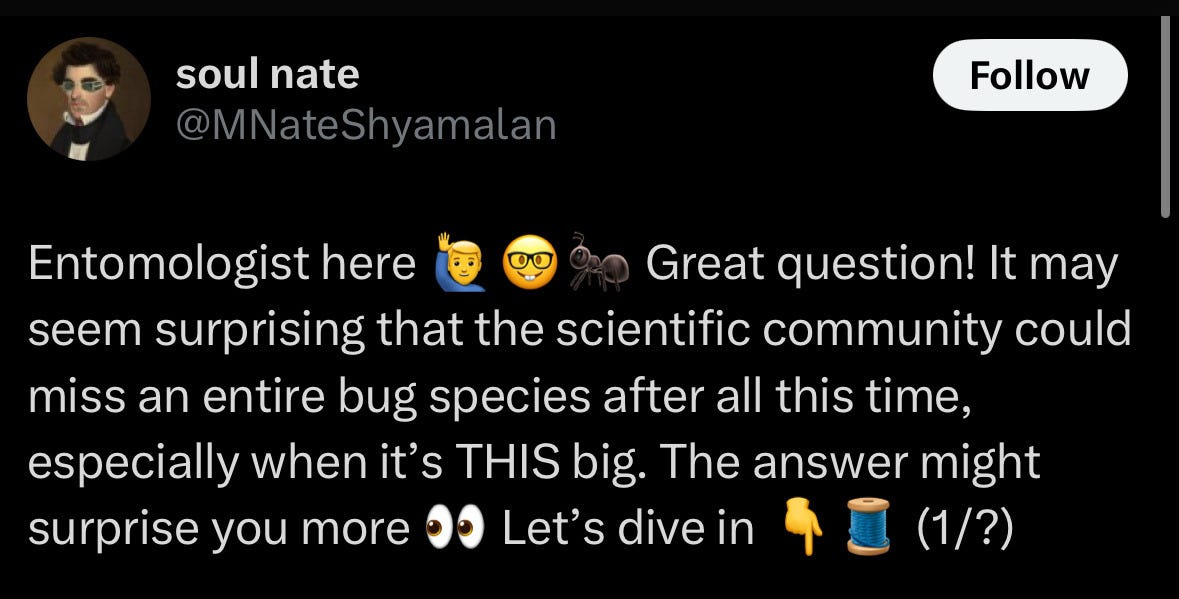Litter With Me!
A new campaign to troll the Russian embassy
Good Morning:
If you live in the DC area, here’s a cool thing to do: go over the Russian embassy on Wisconsin Avenue. Across the street from it, you’ll find the Polonne Sunflower Garden, the sunflower garden a group of us planted—sunflowers being a national symbol of Ukraine and having a weird tendency to drive Putinists insane. As you’ll see, the sunflowers are all dead stalks now, it being the time of the year when the bloom is over and the sunflowers die. We will plant the sunflower garden again in the spring, but until then, we have a grove of dead sunflowers.
All you have to do is pull one out of the ground—which is easy—walk across the street, and drop the sunflower on the sidewalk in front of the embassy. The worst that happens is someone makes you pick it up or gives you a ticket for littering. Please get someone to film you doing this, or take pictures, and post it to social media.
Note: Please do not do this if you are in the United States on TPS or on any other iffy immigration status. I don’t want people getting in trouble. Do this only if your status is such that the worst that can happen to you is a ticket for littering.
Friday on #DogShirtTV, the estimable Holly Berkley Fletcher raised the important question of the process for arresting an inflatable dinosaur. Then the estimable Molly Roberts showed up to talk about the Leticia James indictment.
The Situation
In Friday’s “The Situation” column, I reflect on unorthodox features of former FBI Director James Comey’s arraignment, highlighting the unpreparedness of the prosecution and the clear pride of Comey’s defense team:
On the other side, by contrast, Comey’s lead defense counsel introduced himself as follows: “Your Honor. Pat Fitzgerald, and it’s the honor of my life to represent Mr. Comey in this matter.”
This is a bit of an inversion of the normal understanding of the roles of criminal lawyers. Federal prosecutors typically feel a certain honor and pride in representing the United States in court—believing that their cases represent attempts to do justice. Defense counsel, by contrast, generally think of themselves as representing a check on the justice system’s coercive power in general. But they often don’t take particular pride in their specific individual representations as embodying justice—much less that representing a particular accused miscreant is the honor of their lives. There are exceptions, of course, but I’m not sure I’ve ever seen a case in which the prosecution was so evidently ashamed of its case and the defense so visibly proud to represent someone accused of a crime.
Friday On Lawfare
Compiled by the estimable Isabel Arroyo.
The Trump Administration Pushes the Hatch Act to its Limits
Molly Roberts explains how federal website banners and out-of-office email sign-offs blaming Democrats for the government shutdown implicate—but may not explicitly violate—the Hatch Act, which restricts federal civilian executive branch employees from engaging in political activity.
Whether the Trump administration’s communications do contravene the letter of the law is less obvious than it looks at first glance. But they flagrantly challenge its spirit. The Office of Special Counsel (OSC), the independent agency responsible for Hatch Act enforcement, noted in a 2021 report that “the historical record shows that one of Congress’s motivations in passing the Hatch Act was to prevent the creation of a ‘powerful, invincible, and perhaps corrupt political machine…using the thousands or hundreds of thousands of federal employees, paid for at public expense, to man [a political party’s] political structure and political campaigns.’”
Taking together the banners emblazoned on .gov domains across the Internet and the automatic replies attached to federal employees’ email accounts, sometimes without their permission, it’s difficult not to see exactly such a machine in motion.
The Justice Department’s Dangerously Weak Case Against Letitia James
Roberts analyzes the Justice Department’s indictment of New York Attorney General Letitia James, calling attention to the case’s weakness on the merits as well as career prosecutors’ extreme reluctance to touch it.
Even proving that James made a false statement to a bank seems like a tall task, given it’s unclear she violated the guidelines for second homes. Proving that she intended to deceive the bank—that she had a firm belief those squishy rules forbade her behavior, and so concealed her intentions from her lender—is a more difficult endeavor still.
That doesn’t matter to President Trump’s indefatigable team of loyal lawyers. The case against James for which the Justice Department received a criminal referral didn’t appear strong enough, so Weaponization Working Group Director and Special Attorney for Mortgage Fraud Ed Martin seems to have gone searching for a stronger one. This one ended up too weak for career prosecutors to feel comfortable with it either, so Lindsey Halligan went ahead and took it to a grand jury on her own.
Clop is a Big Fish, But Not Worth Hunting
In the latest edition of the Seriously Risky Business newsletter, Tom Uren discusses ransomware gang Clop’s transition from encryption attacks to less-harmful data extortion, the need to combat state-backed anti-U.S. influence operations abroad, better security at Google Workspace, and ChatGPT’s capacity to detect scams.
The impacts of encryption and extortion attacks are very different, yet both are often generically described as “ransomware” in press coverage and official government guides.
That’s a mistake. Governments need to draw a clear distinction between encrypting ransomware and data extortion, and treat them differently.
Law enforcement and government disruption operations should be focused on the groups that deploy encrypting ransomware because they cause systemic flow-on impacts. Data extortion groups like Clop? Well, they can get to them when encrypting ransomware is under control.
Documents
Tyler McBrien shares the two-count Oct. 9 indictment of Letitia James alleging that she fraudulently falsified records related to a home she owned in Norfolk, VA.
Podcasts
On Lawfare Daily, Ravi Iyer and David Sullivan join Kevin Frazier to unpack the similarities and differences between social media and AI companions, the importance of regulating with the end user in mind, and current policy proposals.
On Lawfare No Bull, Arroyo shares key audio from Attorney General Pam Bondi’s testimony before a Senate Judiciary Committee oversight hearing. The committee questioned Bondi about politicized personnel decisions at the Justice Department, the deployment of the National Guard to states, and antitrust and anti-corruption enforcement.
Videos
On Lawfare Live, I sit down with Loren Voss, Anna Bower, Roger Parloff, and Eric Columbus to discuss litigation over the federalization and deployment of the National Guard in Portland and Chicago, the criminal prosecution of James Comey, and the criminal case against Kilmar Abrego Garcia.
Today’s #BeastOfTheDay is a newly discovered Australian giant stick insect, which you can learn more about here, but which is being honored today for having inspired the following exchange on twitter:
In honor of today’s Beast, be grateful for the simple answers in life.
Keep reading with a 7-day free trial
Subscribe to Dog Shirt Daily to keep reading this post and get 7 days of free access to the full post archives.








